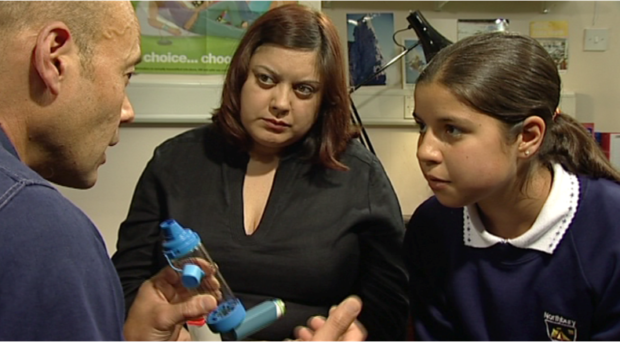
Just over a quarter of a century ago, in 1990, the first British Thoracic Society Guidelines for the management of asthma acknowledged who was really in control when it came to managing asthma. The guidelines advocated that people with asthma should be ‘instructed how to recognise signs that asthma is worsening’ and ‘as far as possible… be trained to manage their own treatment rather than be required to consult their doctor before making changes’.
The concept of ‘self-management’ was in its infancy with only a handful of studies describing the potential benefits of providing people with self-management plans and supplies of emergency treatment. In the intervening period, research in the area has proliferated and we recently reviewed 270 trials which represent a mature evidence base that is strongly supportive of the benefits of self-management.
Evolution of the concept
Self-management plans still focus on advising people with asthma on how to recognize loss of control and the action they should take if that happens.
Reflecting the evolving emphasis on patient/professional partnership, the language used in the guidelines has evolved over the decades. The authoritarian ‘instruct’ was replaced in the 2016 update of the British Thoracic Society/Scottish Intercollegiate Guideline Network asthma guideline by advice to ‘offer self-management education’ to patients. Self-management plans are to be ‘agreed’ not ‘given’.
The core aim, however, has not changed. Self-management plans (now known as ‘personalised asthma action plans’) still focus on advising people with asthma on how to recognize loss of control and the action they should take if that happens. People living with asthma need a broad range of self-management skills, but the core intervention in all the studies we reviewed was the medically focused action plan providing advice on adjusting treatment to restore asthma control, and seeking timely help in case of asthma attacks.
Supporting self-management: the evidence
Our review of the evidence around supporting self-management in asthma addressed five key questions:
Does supported self-management reduce use of healthcare resources and improve asthma control? The unequivocal answer is ‘Yes’. There is consistent evidence that self-management reduces emergency use of healthcare services, and day-to-day asthma symptoms.
In which groups has self-management been shown to work? The studies we reviewed showed benefits in people of all ages from schoolchildren to the elderly; in a range of socioeconomic and cultural communities. Successful interventions were tailored to the target group, used different strategies (such as IT-based interventions for adolescents) and were delivered by different professionals (such as community health workers in ethnic or deprived communities).
There is consistent evidence that self-management reduces emergency use of healthcare services, and day-to-day asthma symptoms.
Which of the components of supported self-management are important? All the studies included core advice on recognizing and responding to deteriorating asthma control, though the form of ‘action plans’ varied. Technological approaches in recent studies were no panacea, but they were shown to be an effective option for those who prefer digital media.
What aspects of the healthcare context enable self-management? Supported self-management is most effective when delivered in the context of structured proactive asthma care, endorsing the leading position of self-management in models of care for people with long-term conditions.
What is the cost to the health service of providing supported self-management? Although there are costs associated with delivering supported self-management these are offset by the significant reduction in hospitalizations and unscheduled consultations. For people with asthma this represents improved asthma-related quality of life. Societal benefits include fewer days of absence from work or school.
The challenge for the future
The evidence for supported self-management is compelling. The challenge now shifts to implementation. Developing effective strategies for embedding supported self-management in routine proactive care for people with asthma should be a priority for healthcare systems. We hope our overview of the evidence will be used to inform the priorities of policy makers, the decisions of healthcare mangers, the skills and quality standards of professionals and the advocacy of patient charities.
This review is part of the work of the Asthma UK Centre for Applied Research. The Centre is a collaboration between the leading asthma researchers from 13 universities across the UK, working with Asthma UK, people affected by asthma, NHS partners and other organisations to improve the lives of people with living with asthma. The Centre has a Twitter account @AUKCAR.
Comments